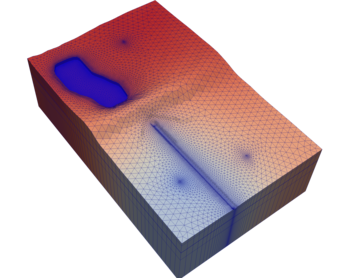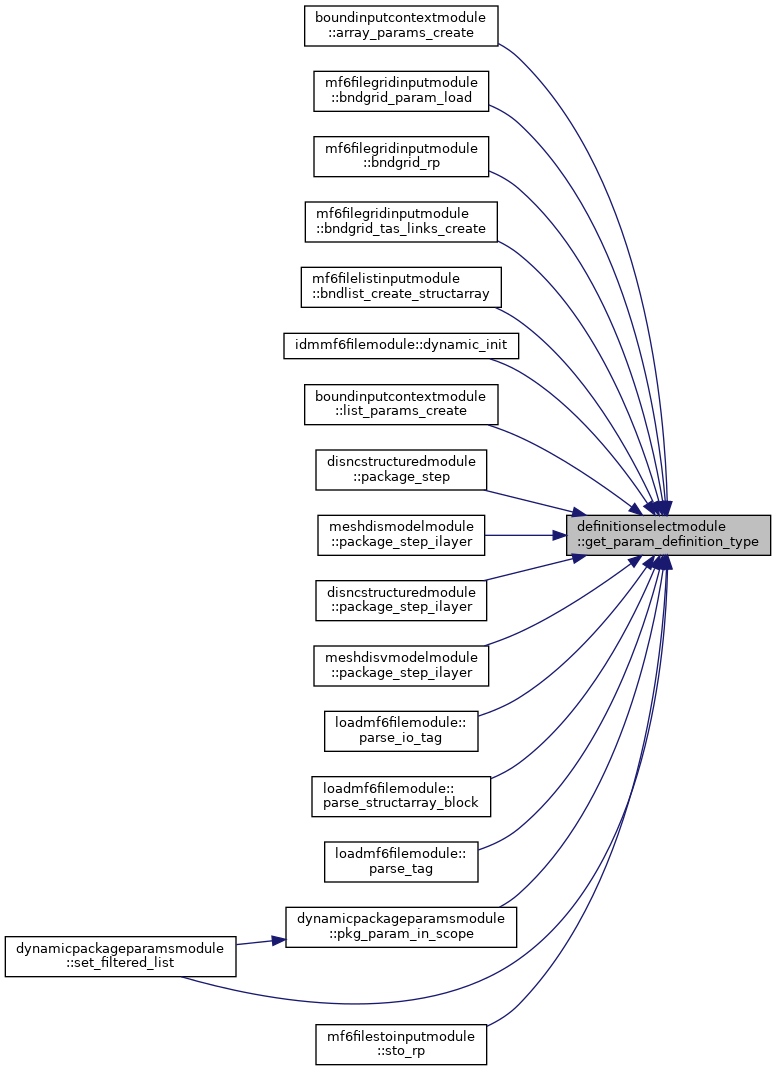 |
MODFLOW 6
version 6.8.0.dev0
USGS Modular Hydrologic Model
|
 |
MODFLOW 6
version 6.8.0.dev0
USGS Modular Hydrologic Model
|
This module contains the DefinitionSelectModule. More...
Functions/Subroutines | |
| subroutine, public | idt_parse_rectype (idt, cols, ncol) |
| allocate and set RECARRAY, KEYSTRING or RECORD param list More... | |
| character(len=linelength) function, public | idt_datatype (idt) |
| return input definition type datatype More... | |
| type(inputparamdefinitiontype) function, pointer, public | get_param_definition_type (input_definition_types, component_type, subcomponent_type, blockname, tagname, filename) |
| Return parameter definition. More... | |
| type(inputparamdefinitiontype) function, pointer, public | get_aggregate_definition_type (input_definition_types, component_type, subcomponent_type, blockname) |
| Return aggregate definition. More... | |
| subroutine, public | split_record_dfn_tag1 (input_definition_types, component_type, subcomponent_type, tagname, nwords, words) |
| Return aggregate definition. More... | |
| subroutine, public | split_record_dfn_tag2 (input_definition_types, component_type, subcomponent_type, tagname, tag2, nwords, words) |
| Return aggregate definition. More... | |
| type(inputparamdefinitiontype) function, pointer, public | idt_default (component_type, subcomponent_type, blockname, tagname, mf6varname, datatype) |
| return allocated input definition type More... | |
This module contains the routines for getting parameter definitions, aggregate definitions, and block definitions for the different package types.
| type(inputparamdefinitiontype) function, pointer, public definitionselectmodule::get_aggregate_definition_type | ( | type(inputparamdefinitiontype), dimension(:), intent(in), target | input_definition_types, |
| character(len=*), intent(in) | component_type, | ||
| character(len=*), intent(in) | subcomponent_type, | ||
| character(len=*), intent(in) | blockname | ||
| ) |
| [in] | component_type | component type, such as GWF or GWT |
| [in] | subcomponent_type | subcomponent type, such as DIS or NPF |
| [in] | blockname | name of the block |
Definition at line 125 of file DefinitionSelect.f90.


| type(inputparamdefinitiontype) function, pointer, public definitionselectmodule::get_param_definition_type | ( | type(inputparamdefinitiontype), dimension(:), intent(in), target | input_definition_types, |
| character(len=*), intent(in) | component_type, | ||
| character(len=*), intent(in) | subcomponent_type, | ||
| character(len=*), intent(in) | blockname, | ||
| character(len=*), intent(in) | tagname, | ||
| character(len=*), intent(in) | filename | ||
| ) |
| [in] | component_type | component type, such as GWF or GWT |
| [in] | subcomponent_type | subcomponent type, such as DIS or NPF |
| [in] | blockname | name of the block |
| [in] | tagname | name of the input tag |
| [in] | filename | input filename |
Definition at line 86 of file DefinitionSelect.f90.


| character(len=linelength) function, public definitionselectmodule::idt_datatype | ( | type(inputparamdefinitiontype), intent(in), pointer | idt | ) |
Definition at line 69 of file DefinitionSelect.f90.

| type(inputparamdefinitiontype) function, pointer, public definitionselectmodule::idt_default | ( | character(len=*), intent(in) | component_type, |
| character(len=*), intent(in) | subcomponent_type, | ||
| character(len=*), intent(in) | blockname, | ||
| character(len=*), intent(in) | tagname, | ||
| character(len=*), intent(in) | mf6varname, | ||
| character(len=*), intent(in) | datatype | ||
| ) |
| subroutine, public definitionselectmodule::idt_parse_rectype | ( | type(inputparamdefinitiontype), intent(in), pointer | idt, |
| character(len=linelength), dimension(:), intent(inout), allocatable | cols, | ||
| integer(i4b), intent(inout) | ncol | ||
| ) |
Definition at line 29 of file DefinitionSelect.f90.


| subroutine, public definitionselectmodule::split_record_dfn_tag1 | ( | type(inputparamdefinitiontype), dimension(:), intent(in), target | input_definition_types, |
| character(len=*), intent(in) | component_type, | ||
| character(len=*), intent(in) | subcomponent_type, | ||
| character(len=*), intent(in) | tagname, | ||
| integer(i4b), intent(inout) | nwords, | ||
| character(len=40), dimension(:), intent(inout), allocatable | words | ||
| ) |
Split a component RECORD datatype definition whose second element matches tagname into an array of character tokens
| [in] | component_type | component type, such as GWF or GWT |
| [in] | subcomponent_type | subcomponent type, such as DIS or NPF |
| [in] | tagname | name of the input tag |
Definition at line 161 of file DefinitionSelect.f90.


| subroutine, public definitionselectmodule::split_record_dfn_tag2 | ( | type(inputparamdefinitiontype), dimension(:), intent(in), target | input_definition_types, |
| character(len=*), intent(in) | component_type, | ||
| character(len=*), intent(in) | subcomponent_type, | ||
| character(len=*), intent(in) | tagname, | ||
| character(len=*), intent(in) | tag2, | ||
| integer(i4b), intent(inout) | nwords, | ||
| character(len=40), dimension(:), intent(inout), allocatable | words | ||
| ) |
Split a component RECORD datatype definition whose second and third elements match tagnames into an array of character tokens
| [in] | component_type | component type, such as GWF or GWT |
| [in] | subcomponent_type | subcomponent type, such as DIS or NPF |
| [in] | tagname | name of the input tag |
Definition at line 218 of file DefinitionSelect.f90.

